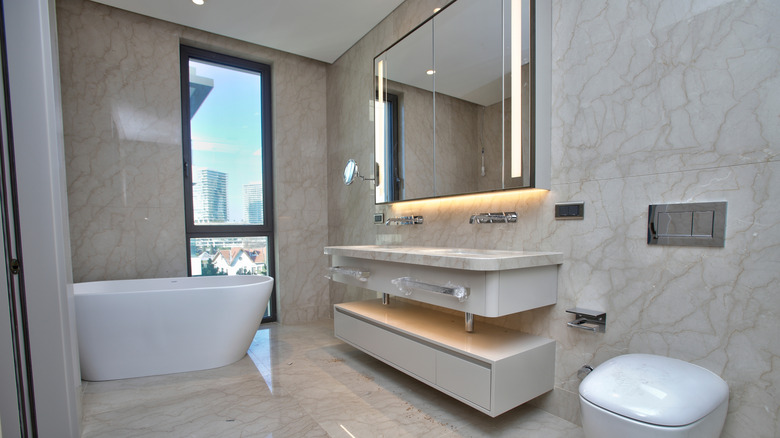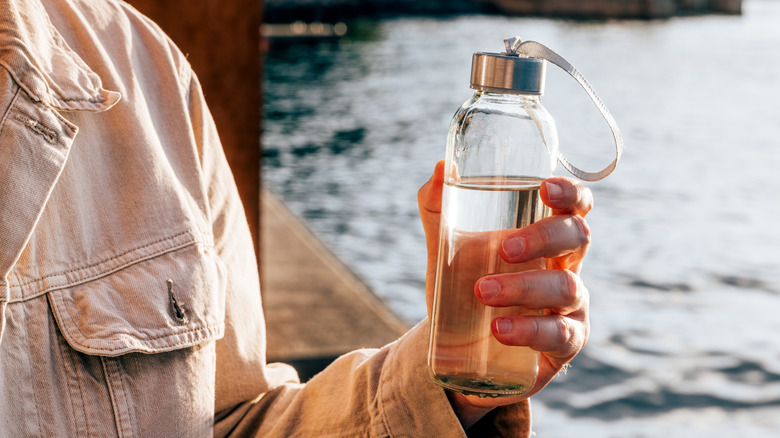Why Tourists Should Avoid Drinking Hotel Tap Water Abroad
We may receive a commission on purchases made from links.
Tap water may be a common drinking source that Americans take for granted, but it's not always the case in other countries. In fact, an innocent glass of water can hide more than you think when you're traveling, particularly when it's filled from your hotel room. Water sitting in pipes (even for short intervals) can pose a problem, as microbial growth could compromise potability. This is especially an issue in hotels, which aren't always fully active, leading to pipes that could be breeding grounds for bacteria such as Pseudomonas aeruginosa, Legionella, and other pathogens, which can be released when the tap is turned on.
This became an even bigger risk for tourists after the COVID-19 pandemic, with Jérôme Logie, a representative from the National Sanitation Foundation, issuing a warning reported by The Sun: "After such an extended period with low to no travel, hotels and their water supplies now pose a significant risk to travelers, something many aren't aware of." He explained how "there is a real risk from potentially lethal bacteria that can thrive in stagnant water, such as in unused hotel pipes." A few years after the worst of COVID-19 and this is still a risk for travelers, as aside from prolonged stagnancy, lower standards of testing and poor infrastructure can expose guests to water carrying harmful microorganisms.
Even countries with generally good tap water quality may have variations at individual sites, and the quality of tap water from hotels is often only ensured up until it enters the property. Once inside, maintenance, filtration, and pipe conditions determine final safety — and these can sometimes fall short abroad. If infrastructure isn't the culprit, there are still waterborne pathogens to consider, such as E. coli, Giardia, and Salmonella, which are common causes of gastrointestinal illness in travelers. These stomach issues can be exacerbated by a lack of local immunity to these organisms, making tourists more susceptible to symptoms like diarrhea, vomiting, fever, and dehydration.
How to stay safe and hydrated without drinking hotel tap water
Avoiding hotel tap water doesn't mean compromising hydration. Start by researching your destination's water safety before you leave. Developed countries don't automatically guarantee safe drinking water, and it can even be hard to find drinkable tap water in European countries like Hungary and Albania. Check out the CDC's Travelers' Health pages before your flight to be totally certain.
Once at your destination, it's safest to steer clear of hotel tap water. Instead, use bottled water from unopened, factory‑sealed containers. Make sure to check the seal before purchasing, especially in countries where refilling counterfeit bottles is known to happen. Of course, there are also strategies that don't require drinking out of harmful plastic water bottles, including carrying a jug that you can refill when you come across safe sources. There are even portable purification supplies, such as the Steripen UV Personal Water Purifier, or filter bottles like the LifeStraw Insulated Stainless Steel Bottle that effectively eliminate microorganisms. If you want to skip the hassle of adding more to your luggage, there's always the tried-and-tested method of just boiling the tap water.
While on vacation, try to maintain hygiene awareness even beyond drinking. The CDC recommends keeping your mouth closed in the shower and avoiding brushing your teeth with tap water unless you are 100% sure it's potable. By remembering these tips and practicing them abroad, you'll be able to stay hydrated and safe throughout your trip.

